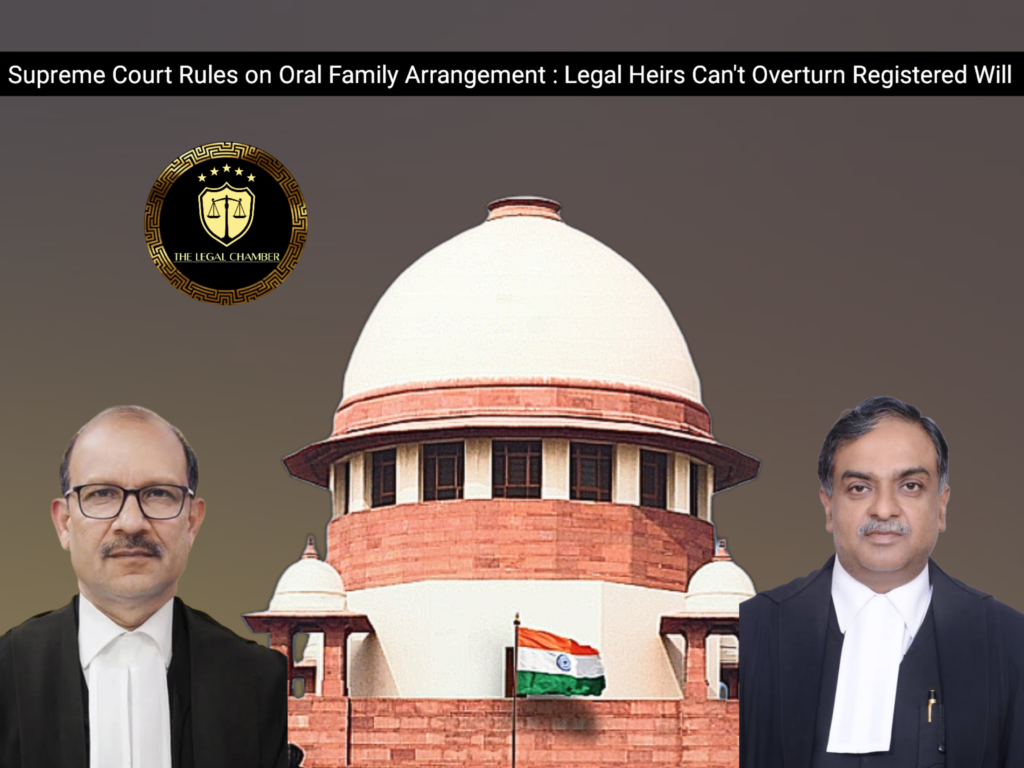
The Supreme Court upheld the validity of a registered Will executed by Metpalli Rajanna, recognizing its presumption of genuineness under law. The Court ruled that the burden to disprove the Will lay on the contesting party, which was not discharged. It emphasized that the oral family settlement, supported by possession and revenue records, further validated the Will’s distribution of properties. The trial court’s decree granting absolute rights to the plaintiff under the Will was restored, overturning the High Court’s interference. The judgment reaffirmed the sanctity of registered Wills and family arrangements in property disputes.
Facts Of The Case:
The case involved a dispute over 4 acres and 16 guntas of land in Dasnapur village between the legal heirs of Metpalli Rajanna. Rajanna, the original landowner, had two marriages—first with Narsamma, with whom he had two children, Muthaiah and Rajamma, and later with Lasum Bai, who bore no children. Before his death in 1983, Rajanna allegedly executed a registered Will in 1974, distributing his properties among his second wife, Lasum Bai, his son Muthaiah, and his widowed daughter Rajamma. Lasum Bai claimed ownership of a portion of the land under the Will and an oral family arrangement, while Muthaiah contested its validity, asserting the land was ancestral joint family property. Lasum Bai sold part of the land to third parties, prompting Muthaiah to file an injunction suit, which was decreed in his favor but left the title dispute unresolved. Lasum Bai then filed a suit for declaration of title, which the trial court upheld based on the Will and family arrangement. The High Court partially allowed Muthaiah’s appeal, reducing Lasum Bai’s share. The Supreme Court reversed the High Court’s decision, restoring the trial court’s decree and affirming the validity of the Will and family settlement.
Procedural History:
The dispute originated when Muthaiah filed Original Suit No. 101 of 1987 seeking an injunction to restrain Lasum Bai from selling the disputed land. The District Munsif, Adilabad, decreed the suit in Muthaiah’s favor on 6th July 1990, but clarified that the title dispute remained open. Lasum Bai then filed Original Suit No. 2 of 1991 for declaration of her title, which the District Judge, Adilabad, decreed in her favor on 15th November 1994, upholding the validity of the registered Will and family arrangement. Muthaiah and Rajamma appealed to the High Court of Andhra Pradesh at Hyderabad (Appeal Suit No. 178 of 1995), which partially allowed the appeal on 23rd January 2014, reducing Lasum Bai’s share to 1/4th and recognizing Muthaiah’s 3/4th claim. Dissatisfied, both parties filed Civil Appeal Nos. 5921 & 5922 of 2015 before the Supreme Court, which, on 21st July 2025, reversed the High Court’s decision, restored the trial court’s decree, and upheld the Will’s validity, dismissing Muthaiah’s challenge.
READ ALSO:Landmark Judgment: Supreme Court Orders Eviction of Bidder Who Failed to Pay for 3 Decades
Court Observation:
The Supreme Court made several key observations in its judgment. Firstly, it emphasized the presumption of validity attached to a registered Will under Indian law, placing the burden of disproving its authenticity squarely on the contesting party. The Court noted that Muthaiah’s admission of his father’s signatures on the Will significantly weakened his challenge.Secondly, the Court observed that the oral family arrangement, though unregistered, was substantiated by long-standing possession patterns and revenue records, lending it credibility. It highlighted that the conduct of parties—particularly Muthaiah’s failure to challenge Lasum Bai’s earlier land sale—implied acceptance of the arrangement.Thirdly, the Court rejected the High Court’s interference, stressing that the trial court’s findings on the testator’s sound mind and fair distribution of assets were based on cogent evidence. It underscored that the Will’s terms, which allocated shares to all legal heirs, negated any suspicion of manipulation.Finally, the judgment reinforced the sanctity of testamentary dispositions, ruling that absent proven fraud or coercion, a registered Will coupled with corroborative evidence must prevail over claims of ancestral joint ownership. The Court thus restored the trial court’s decree, affirming Lasum Bai’s absolute rights under the Will.
Final Decision & Judgement:
The Supreme Court allowed Civil Appeal No. 5921 of 2015 filed by Lasum Bai’s legal representatives and dismissed Civil Appeal No. 5922 of 2015 filed by Muthaiah’s heirs. The Court set aside the High Court’s judgment and restored the trial court’s decree, upholding Lasum Bai’s absolute ownership rights over the disputed property as per the registered Will of 1974. The Bench, comprising Justices Vikram Nath and Sandeep Mehta, held that the Will was validly executed and the oral family arrangement was sufficiently corroborated by possession and revenue records. The Court emphasized that Muthaiah’s failure to challenge the Will’s authenticity or Lasum Bai’s prior land sale weakened his claims. The judgment reinforced that registered Wills carry a presumption of validity and cannot be lightly overturned without concrete evidence of fraud or undue influence. No costs were awarded, and all pending applications were disposed of accordingly. The ruling, delivered on 21st July 2025, brought finality to the decades-long property dispute.
Case Details:
Case Title:Metpalli Lasum Bai (Since Dead) and Others vs. Metpalli Muthaiah (D) by LRs. & Another Citation:2025 INSC 879 Civil Appeal No(s):5921-5922 of 2015 Date of Judgment:21st July 2025 Judges/Justice Name:Justice Vikram Nath & Justice Sandeep Mehta
Download The Judgement Here